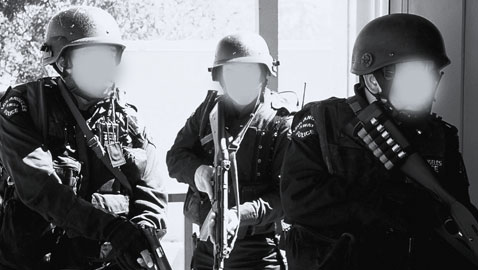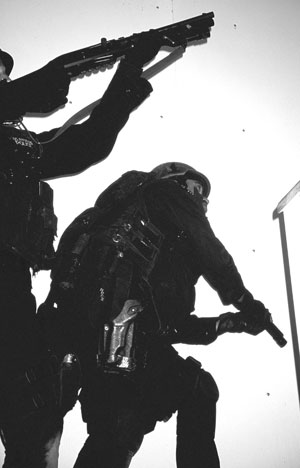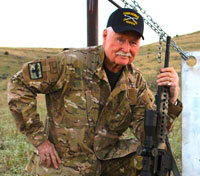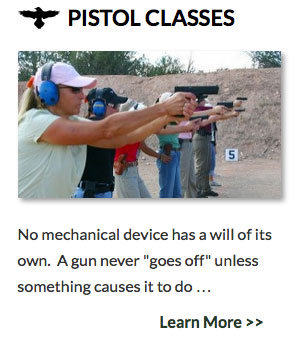Widgetized Section
Go to Admin » Appearance » Widgets » and move Gabfire Widget: Social into that MastheadOverlay zone
SWAT TALK: Saving The Drugs!

No-knock forced entry raids must be done only when other options are not feasible.
Originally created by the Los Angeles Police Department following the (first) Watts Riot, the concept of Special Weapons And Tactics began as an embryonic entity that soon began to evolve into a finely tuned art. While many LAPD officers had a part in what their agency’s SWAT unit became, most would agree that the LAPD’s Sgt. Ron McCarthy was the heart and sole of it.
Not only was the LAPD SWAT unit the first of its kind and the originator of the name, but it was also probably the most strictly regulated, as to when the unit would be called out and what action it would take. The LAPD calls these actions “SWAT Options.” First having been exposed to Ron McCarthy’s teachings almost thirty years ago, I used them as the basis for my own lesson plan and we incorporated them in the revision of my agency’s general orders when our department became accredited.
SWAT tactics must remain somewhat open to change due not only to technology, but also better ideas, but some things stay pretty much written in stone. In the decades during and following my career, I have talked and written about SWAT Options and what does and doesn’t work dozens of times. However, a million times wouldn’t be enough, not if a single officer dies because something could have been done better, and safer.
Negative Reinforcement

No search is routine. Having SWAT clear a location first is best.
The problem is that there are thousands of new officers coming up all the time. If they don’t get the word, or are assigned to a less than great field training officer (FTO), they will make more mistakes than not, and they may neither recognize nor admit them. This is most dangerous when a major bad call is made, but the officer(s) comes out smelling like a proverbial rose. The tendency then is to overlook the mistake and assume that this was the way the matter should have been handled. Getting patted on the back will multiply the problem. I call it “Negative Reinforcement.” Always be honest and critique yourself. It might save your life next time.
It’s no different with SWAT, except that the egos may be larger. Even though first responders are the ones who are usually charged with “preventing the killing, stopping the killing and preventing the dying,” it’s the SWAT cops who are trained to deal with especially tough situations using special equipment & etc. The problem is that we grow to love doing raids, taking down doors and throwing flash-bangs so much that we sometimes automatically decide to go that route when it’s unnecessary; when there is a better way, a safer way – been there!
A good example of this is a lone, barricaded perpetrator. It must always be assumed he or she is armed, so why rush in? That’s what negotiations and, if necessary, chemical agents are for. Another example is the case in point of this writing and that’s doing a drug raid. Let’s look at a common scenario.
Undercover officers have made enough buys to obtain arrest and search warrants. Even worse, the location might involve a meth lab, and UC wants SWAT to do a raid with a forced entry. The question is why?
The justification we usually hear is “to prevent the suspects from getting rid of the drugs.” Again, why? Are additional drugs, or the lack thereof going to make or break the case? Why force your way into someone’s house (assuming you have the right house) if you don’t have to? Why subject your people and anyone in the house to unnecessary danger, especially if there are non-combatants inside like children? Think about all the officers you’ve heard about (or knew) who where seriously injured or lost their lives doing raids that were unnecessary. For what? Ego? To save the drugs? Let’s look at an alternative.
You’ve got a warrant to arrest and search the premises. Does the subject have a job? Does he or she have any type of routine? When do they leave the premises? Why not conduct an undercover stakeout? Then if/when the subject(s) leave, have uniformed patrol make the stop a safe distance from the house and arrest the subject. You can then question him or her for information and return to the location with the suspect, if possible and let SWAT enter and clear the location before the search. If that’s a no-go you can use SWAT to treat the situation as a barricaded suspect, negotiate & etc. This course of action almost always results in successful solution. If additional drugs are lost it’s not the end of the world?
Think about it; cops don’t come cheap. Money can recruit and train new ones, but nothing can replace husbands, wives, sons, daughters, brothers, sisters, moms, dads or friends. If you’re a cop and you haven’t yet felt the agony of losing a brother or sister officer, trust me, it’ll be a bad day! Even if none of your people are hurt in a raid, the suspect or non-combatants may be injured or worse. How many officers’ careers have been ruined, as a result of bad decisions?
What if this line of reasoning is contrary to your agency’s general orders? Work to get them changed. Does a superior officer stand in the way? Remind him or her of vicarious liability and do it on paper! Believe me, it works.
Sadly, this will reach relatively few officers. Even if it could be repeated at all roll calls and in-service training not everyone would get the word, but you just did, and maybe you can help spread it. In the meantime remember, “The Best Raid You Can Make Is One You Can Avoid!”
GPJ 1*
About the author:
 Having fired his first shot at the age of 5 by killing a pig his uncle was going to butcher, Gary Paul Johnston began a lifelong interest in firearms, hunting and shooting. Beginning a 28-year in law enforcement in 1963, Gary worked every division, always favoring uniformed patrol where the action was. He began writing in 1976 with nearly 2,000 articles on firearms published to date, along with two books, Custer’s Horses and co-authoring The World’s Assault Rifles. Having attended more schools on shooting and tactics than he can count, Gary is still learning, He says that if he can pass on even a little to others of what he has learned he will have achieved a worthy goal. Gary and his wife, Nancy, also a retired police officer, live in Colorado, are both Life Members of the NRA and strong 2nd Amendment advocates. Gary is also featured on MidwayUSA’s Gun Stories.
Having fired his first shot at the age of 5 by killing a pig his uncle was going to butcher, Gary Paul Johnston began a lifelong interest in firearms, hunting and shooting. Beginning a 28-year in law enforcement in 1963, Gary worked every division, always favoring uniformed patrol where the action was. He began writing in 1976 with nearly 2,000 articles on firearms published to date, along with two books, Custer’s Horses and co-authoring The World’s Assault Rifles. Having attended more schools on shooting and tactics than he can count, Gary is still learning, He says that if he can pass on even a little to others of what he has learned he will have achieved a worthy goal. Gary and his wife, Nancy, also a retired police officer, live in Colorado, are both Life Members of the NRA and strong 2nd Amendment advocates. Gary is also featured on MidwayUSA’s Gun Stories.



 MidwayUSA
MidwayUSA Ruger Firearms
Ruger Firearms SCCY Firearms
SCCY Firearms Streamlight
Streamlight Action Targets
Action Targets Gunsite Academy
Gunsite Academy
2 Responses to SWAT TALK: Saving The Drugs!
You must be logged in to post a comment Login